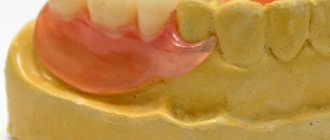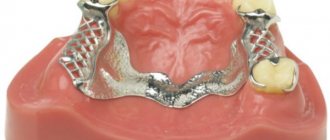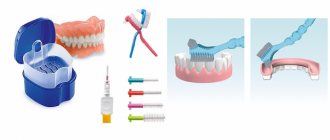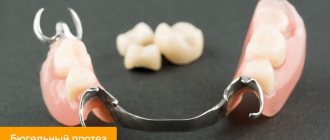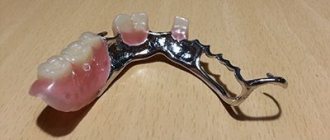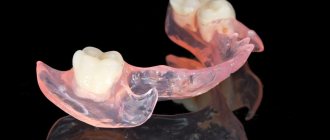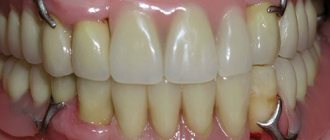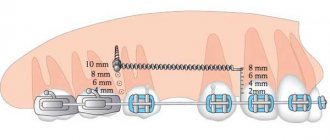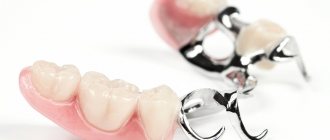Caring for dentures
- Types of structures
- Plastic dentures
- How to care at home
- How to care and store
- Nylon dentures
- Clasp dentures
- Care products
Dentures require careful care.
In order for them to serve their owners for a long time, you need to learn how to carefully care for them and store them correctly. Their insufficient cleaning and non-compliance with hygiene rules often cause destruction of neighboring teeth, inflammation of the gums, and bad breath. It is also important to listen to the recommendations of the doctor, who, when installing such structures, should tell the patient how to use them correctly. Dentures will retain their original appearance for a long time, provided:
- choosing the right cleaning product;
- maintaining daily oral hygiene;
- Visit the dentist at least twice a year for professional cleaning.
The main task of people who wear such designs is to maintain their aesthetics and durability. This can only be achieved if denture care is carried out in accordance with their type.
What methods should you use to clean?
Understanding how to clean a clasp denture, the following methods can be distinguished:
- home care - carried out by a person independently: such care is divided into 2 more types - regular (“clasp” can not be removed from the mouth before cleaning) and periodic (requires removal of the denture). Let's look at them in more detail below,
- professional care – carried out only in a dental clinic (we’ll also talk about that later).
Don't know what type of prosthetics to choose?
We will help in the selection, advise where to read more information and compare types of prosthetics.
Consultation with an orthopedic doctor in Moscow clinics is free! Call now or request a call
Working hours: from 9:00 to 21:00 - seven days a week
Types of structures
There are two types of dentures: removable and fixed. Nylon and acrylic models are removed and can be cleaned with running water, preferably boiled. But it is better to clean with special solutions that are effective in getting rid of bacteria. They are purchased in pharmacies in ready-made form or in tablets dissolved in water. To fix such structures, glue, cream or strips are used.
These care methods also apply to partially removable structures, which include clasp models. Fixed veneers, implants, bridges, crowns require more careful care. Dental floss is used to clean hard-to-reach areas. Interdental brushes are also effective. You need to complete the procedure of cleaning from food debris by rinsing your mouth using special products.
Accustoming stage
As with any external implantation, you definitely need to get used to installing prostheses. At the initial stage, you will definitely feel severe discomfort. It is possible that unwanted problems with diction will arise and taste sensations will change. Against this background, it is important for the patient to show psychological resilience.
Strong vomiting and excessive salivation are considered completely undesirable phenomena.
Oddly enough, a person gets used to permanent dentures faster than removable ones. The entire adaptation period depends on the following factors:
- Product size.
- Fixation method.
- Degree of fixation.
- The body's reaction to the introduction of a foreign body.
- On the nature of the impact.
There are times when the denture rubs the gums. In this situation, you definitely need to visit the dentist, otherwise a strong inflammatory process will begin.
To make the addiction process easier, you need to adhere to the following rules:
- Keep your teeth and dentures clean.
- Clean installed structures using dental floss.
- Massage your gums regularly.
- In case of gum rubbing, use a fixing cream, for example, Corega.
Plastic dentures
Rinsing after eating, cleaning with toothpaste, disinfection - these are the main rules for caring for plastic dentures.
The ideal option would be to clean them regularly after eating. If this is not possible, thorough cleaning 2 times a day is allowed. To remove plaque in hard-to-reach places, brushes and dental floss are additionally used.
Plaque is removed by washing with water, brushing with a special paste, and the procedure ends by placing the structure in an antiseptic solution. Twice a year it is necessary to take it to the dentist for professional cleaning to remove deposits and stones.
Causes of wear
- Use of abrasives. When cleaning the denture with toothpaste with a whitening effect, scratches may appear on the structure, which contributes to the accumulation of bacterial plaque on the denture.
- Insufficient maintenance of the structure. A dirty denture often causes rapid wear and tear and causes inflammation in the oral cavity.
- When smoking, drinking coffee or strong tea, dental structures turn yellow and a brown plaque forms on them, which is difficult to remove.
How to care at home
The products used to clean your home can achieve good results. The most important thing is to regularly care for your dentures at home. But professional cleaning should be an equally significant addition to home care.
When cleaning them at home you need to use:
- with a soft toothbrush (carefully treat areas of contact with the gums);
- non-abrasive toothpaste (you can use gentle children's toothpaste);
- tablets - indicators of bacterial plaque;
- disinfectant solutions (antiseptics, rinses containing chlorhexidine, special tablets).
Treatments using vinegar or lemon are especially popular. Frequent cleaning with vinegar is not advisable, as it negatively affects the strength of the teeth. You can use this method sometimes by placing the structure in vinegar for 2 hours.
It is safer to mix a quarter of a lemon with toothpaste or powder and apply the mixture and leave for 20 minutes. Then rinse with running water. Some people try to use baking soda, but doctors say there are no results from such cleansing, despite the prevailing opinion about its effectiveness.
How to care for and store dentures
In the past, when removable plastic structures were made from air-drying rubber, they were stored in an aqueous solution. Now they are made on the basis of acrylic and nylon, which do not require such storage.
Proper care and storage of dentures is an important condition for their long service life. Therefore, it is worth listening to the advice of doctors who recommend not removing them at night, especially immediately after installation, so that the person can get used to them and the articular heads of the jaws do not move. When removing them at night, they do not need to be kept in liquid; they can be left dry, wrapped in a clean napkin.
It is not recommended to remove clasp structures while sleeping, especially if you have periodontal diseases, but if you need to remove them for a short period of time, they need to be thoroughly cleaned, dried and placed in a case.
Nutrition
- When using a clasp design, for the first time after installation, while adaptation to the design occurs, you need to eat only soft food.
- You should not bite food with your front teeth. Chew food only with the help of the lateral teeth, distributing it evenly on the right and left jaws.
- When you get used to the prosthesis, you can gradually switch to your usual food, but nevertheless, for the successful functioning and durability of the clasp prosthesis, it is necessary to minimize or eliminate hard, sticky and viscous foods from the diet.
- When chewing hard food, the artificial tooth may break off and cause structural failure.
- You can train your chewing skills by eating fruits or vegetables cut into small pieces.
- Viscous and sticky food can stick to the denture and cause it to break.
Nylon dentures
To preserve the properties of nylon structures for a long time, we must not forget about special care, otherwise the loss of their aesthetics and functionality and an unpleasant odor are guaranteed.
Caring for nylon dentures involves home and professional cleaning. When cleaning the house, nylon can be scratched if you use hard brushes. Therefore, it is recommended to acquire only soft models of brushes and pastes that do not contain abrasive substances. To protect against damage, they should be put on or taken off over a sink filled with water. You can fold a terry towel in several layers and carry out these manipulations over it.
Due to the fact that this material is capable of absorbing foreign odors and being stained by drinks and food, wearers of such prostheses need to disinfect them more often. For these purposes, dental nylon liquid, cleansing tablets such as Corega or ROCS are used.
To remove bacterial plaque from them that cannot be cleaned at home, an ultrasonic bath is used. The procedure is performed by a doctor in the clinic, where he also examines the gums under the structure. Thanks to the use of ultrasound, the surface gets rid of not only bacteria, but also coloring substances (nicotine) and tartar.
Clasp dentures
Partially removable clasp structures are made from different materials. The most commonly used materials are cermets and plastics. Depending on the type of material, it is determined what the optimal care for clasp dentures will be.
The peculiarity of caring for them is explained by the fact that their arches are made of metal. This requires a special approach to cleaning. When an arc is made of several separate parts, the joints should not be mechanically processed to avoid darkening and staining on them. When cleaning, only use a soft brush. Otherwise, care is similar to that of other removable models. Only once a week you need to treat them in a biological solution designed to remove stubborn stains and food debris.
If home care does not give the desired effect, then professional cleaning is recommended to remove hard deposits and plaque. This needs to be done once every six months.
It is not necessary to remove the clasp structures at night, especially during the first 2 weeks.
Care products
Modern means for caring for dentures are varied and more effective than the old-fashioned solutions with soda and potassium permanganate, which will do more harm than good. They are specially designed for different types of structures, therefore they are absolutely harmless.
Care products can be fixative or cleansing. The most popular of them are fixing adhesives and creams. They contribute to a reliable fit of the prosthesis and redistribution of the load during chewing. It prevents food debris from getting under them and does not rub the gums, since the glue creates an airtight cushion. At night, the structure with fixing substances must be removed, this is the condition for their use.
Fixing powder is suitable for people with weak salivation. A thin layer of powder is applied to the structure, which is pressed tightly against the gums, creating an obstacle to food particles. And strips of special canvas for fixation are necessary if a person has an abnormal jaw structure.
Another common remedy is special tablets that dissolve in water. This solution can not only clean dentures, but also whiten them. True, they do not work on persistent nicotine stains; you will need the help of a dentist who will remove them with ultrasound. This needs to be done every six months.
Rinsing, cleaning, disinfection, professional care - these are the main components of the care process. And what means are used for them will depend on the specific model of prostheses.
After what food do you need to clean especially carefully?
Hygiene should be carried out especially carefully - and even remove the denture once again and clean it on all sides, after consuming such types of food and drinks as:
- viscous candies, desserts,
- dishes with lots of herbs and spices,
- brightly colored food,
- lump meat (kebab, beshbarmak, etc.).
Particles of such food get stuck under the base and fastenings for a long time and are difficult to wash out with regular rinsing. And pigments quickly eat into porous synthetic polymers (pink gums, white crowns). If they are not removed in a timely manner, then even professional cleaning in a clinic will not always cope with whitening the structure.


